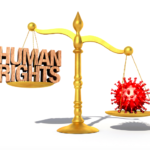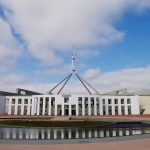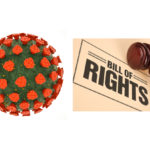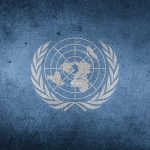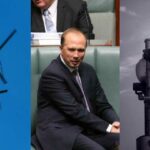Rights Infringements Are Likely to Worsen in an Era of Mounting Crises
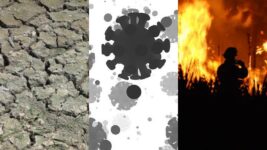
As the COVID-19 pandemic has dramatically revealed, government responses to crises result in the winding back of citizens’ rights. And this unleashing of emergency powers, coupled with the withdrawal of freedoms, exposes the bare bones of the body politic.
The onset of the virus sparked laws long lying dormant in state and federal legislation that permit government to take drastic action to curb risks to public health.
These measures, such as lockdowns and social distancing, were warranted, especially when no protections against COVID existed.
Although, in order to facilitate the pandemic response, Australian governments turned to their go-to solution, that being law enforcement.
And soon heavily armed police were patrolling the streets, enforcing laws issued by decree, and handing out steep fines to those stepping outside without a valid excuse.
The imposition of these unprecedented restrictions, unsurprisingly, bred fear and anxiety within the community, and subsequently resentment, which, in turn, led to a rising awareness that rights aren’t adequately protected in this country, no matter where one stands on the mask-wearing divide.
As this understanding that rights guarantees are lacking grows, so too are the calls to enact a federal bill of rights, enshrining citizens’ freedoms and liberties in law.
However, it’s not that simple, as successive governments have repeatedly resisted enacting such safeguards for the express reason that it limits their own power. And with the clear prospect of further crises before them, it would seem rather convenient just to leave things as they are.
A brief history of rights denial
Today, Australia is the only liberal democracy on the planet that doesn’t have a federal bill safeguarding citizens’ rights under law. And this is a key reason why recent legal challenges to public health orders have been doomed to fail in the courts.
As former High Court Justice Michael Kirby explained in a 1994 article, whilst the drafting of the Australian Constitution was taking place during a series of 1890s meetings, Australasian Federation Convention constitutional committee member Richard O’Connor suggested adding a bill of rights.
This was opposed by fellow committee member Sir Isaac Isaacs. And the idea was subsequently voted down.
As Kirby notes, the concern was that such a bill would interfere with “discriminatory provisions of the law of that time”, especially those that “disadvantaged Aboriginal people and the Chinese in Australia”.
In the second half of the nineteenth century, laws were enacted designed to limit the number of Chinese people entering the continent by boat.
And it might be thought that the post-federation rollout of the series of laws known as the White Australia Policy might have been stymied if general rights were protected, especially in terms of the Pacific Islanders Labourers Act 1901 (Cth), which sought to deport all Pacific Island peoples.
First Nations rights denial
The nation that is Australia was predicated on the denial of the existence of the First Peoples of this continent, who’d been residing here for tens of thousands of years.
This was based on the doctrine of terra nullius – a legal fiction that nobody lived here – which the High Court overturned in its 1992 Mabo decision.
But despite the initial denial that First Nation societies existed, NSW governor Lachlan Macquarie declared British law applied to Aboriginal people in 1810. And he also extended protections to them in 1816, which was the same year he issued a decree providing for their wholesale murder.
A series of so-called Aboriginal protection laws were passed beginning with the Aboriginal Protection Act 1869 in Victoria. This was followed by similar such laws in Western Australia in 1886, as well as protection legislation being passed in NSW, South Australia and Queensland after federation.
These laws permitted the removal of First Nations peoples from their lands and food sources. They were then placed on reserves, missions and stations, with police enforcing strict rules controlling all aspects of their lives, including restrictions on speaking their own language or practicing customs.
Protection era laws further facilitated the Stolen Generations, which saw tens of thousands of children forcibly removed from their families and placed in boarding homes, with the girls often being sent off to work as servants in white households.
Right now, First Nations peoples are the most incarcerated people on the planet. Aboriginal and Torres Strait Islander peoples make up 30 percent of the adult prisoner population in Australia, whilst only accounting for less than 3 percent of the overall populace.
And Aboriginal deaths in custody continue unabated.
Seeking asylum
Australia ratified the 1951 Refugee Convention in January 1954, which means our nation has agreed to provide asylum to refugees who turn up on our shores seeking protection and a new life after fleeing persecution.
But rather than deliver on this pledge, successive Australian governments have at some point locked up over 4,000 asylum seekers in offshore detention centres since July 2013. This has been regardless of refugee status. And at present, over 200 asylum seekers remain in Nauru and Papua New Guinea.
This system has seen thousands of people, including children, grinded down by our government not for committing any crimes, but simply to use their bodies and minds as examples to warn others not to come to our country seeking asylum or else, they’ll be purposefully destroyed as well.
The surveillance state
Since 9/11, Australian governments from both sides of the political divide have been passing antiterror laws. At the federal level, this has seen 92 counterterrorism and national security bills passed that contain laws which work to erode the rights of all citizens and residents.
Following the 2001 New York terror attacks, the UN passed a resolution calling on all states to pass antiterror laws. However, as UNSW Law Professor George Williams explained in 2017, the lack of rights protections in this country saw our nation outstrip others in terms of volume and reach.
This framework of laws has resulted in an ever-growing surveillance state, with the last such bill providing a warrant system authorising authorities to hack into devices or online accounts, while 2018 provisions established a means to get around communication providers’ encrypted systems.
So, in the name of protecting the nation against foreign agents, Canberra has enacted laws that now see a number of controversial political prosecutions underway, as well as a crackdown on press freedoms, and a system of laws that can restrict people’s actions before they even commit a crime.
Conflicting rights
It’s against this questionable human rights record that a broad number of middle Australians have suddenly found themselves with their freedoms curtailed by a governing body that going back to its inception has usurped the rights of many minorities in order to progress its own agenda.
During the pandemic, a federal bill of rights could have served as a means to inform the rollout of measures, so they weren’t unnecessarily burdensome, and it would have enhanced public debate around whether and why such measures were needed to stop the spread of the virus.
A bill of rights “allows us to look at how we balance and adjudicate competing rights”, NSW Council for Civil Liberties president Pauline Wright told Sydney Criminal Lawyers last month.
“And we have seen how that works in times of pandemic, with the greater population’s right to health coming into conflict with the individual right to freedom of movement.”
However, rather than living under a system that informs the public of their rights or raises the implications a major pandemic could have before it strikes – especially as scientists had long been warning of one – Australian authorities simply left it all to law enforcement at the last minute.
The greater crisis
Scientists are warning that humanity is likely entering an era of pandemics. And while this prospect is of major concern both in terms of the threat to public health, as well as the preservation of individual freedoms, the much more formidable crisis that’s looming is the climate emergency.
The draconian measures that were recently implemented were unwillingly rolled out by government in order to curb the threat posed by the coronavirus. This reluctance has been exposed with the widespread resistance to reengage these measures with the onset of the Omicron variant.
However, changing climate presents a very different scenario. Currently, major greenhouse gas emitting nations around the globe are doing their best to be seen to be doing something to prevent rising temperatures, whilst, at the same time, they continue raking in fossil fuel profits.
So, rather than benefiting by bringing an end to a crisis like the pandemic, those in power are seeking to gain via the ongoing exacerbation of the climate emergency for short-term personal and corporate profits to the detriment of the globe and all future generations.
A recent Transnational Institute report outlines that instead of working to mitigate the effects of global heating, nations, like Australia, Canada and the US, are investing in fortifying their borders to prevent the influx of climate refugees already beginning to appear around the world.
But, as the recent prolonged south eastern Australian drought and the Black Summer bushfires have shown us, no matter how militarised our borders have become, these fortifications cannot keep out the effects of changing climate.
Indeed, accelerating extreme weather events are set to cause devastation right across the continent, which will only serve to exacerbate pre-existing inequalities on the ground.
And with no rights safeguards to stop them, those in power may consider it opportune to apply tried and tested authoritarian measures that controlled the community at a time when a deadly virus was circulating, in a genuine attempt to suppress people undergoing severe deprivations.
Main images: “Pinang Tunggal Drought” by Marufish is licensed under CC BY-SA 2.0. This is a representation of what the Covid-19 virus would look like under a powerful microscope by HFCM Communicatie is licenced under CC BY-SA 4.0. “Wildfire” by USFWS/Southeast is marked with CC PDM 1.0.


